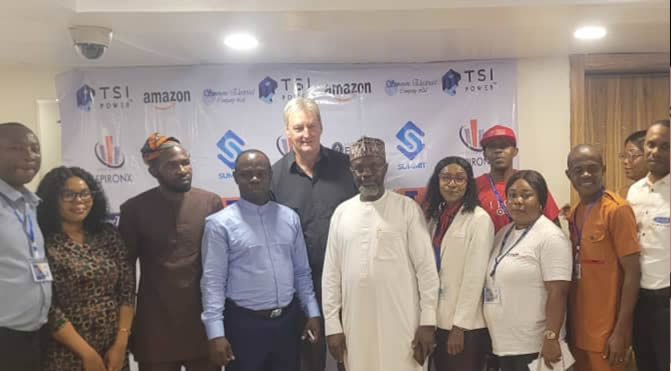TSi Power and Energy Control Systems have unveiled solutions to help Nigerian businesses reduce operational losses caused by poor electricity supply and downtime, from voltage instability and surges to harmonics.
The firms introduced their technological solutions to mitigate the impact of bad power on sensitive electronic and industrial equipment at their first power quality conference in Nigeria, held on July 25 in Lagos. It was themed ‘Maximising industrial electronic investment through high-performance protection systems.’
Managing Director of Asprinox, Tim Chima, emphasised the growing importance of high-performance power conditioning systems in driving industrial productivity. His keynote address explained how Asprinox Power is diagnosing power problems and providing solutions that ensure long-term stability and equipment protection.
He said the new technologies, developed and deployed globally by top American manufacturers, are specifically designed to stabilise power, protect sensitive industrial equipment, and optimise the electricity supply from the national grid.
Chima said, “What we are doing today is to open up that little niche, which is a $34bn industry. Many companies fail because they cannot continue to run losses due to bad power, and we are introducing to the Nigerian market power quality at its best so that available power can be maximised.”
He added that the flagship products, the Sinetamer Surge Protection Device and the VRP (Voltage Regulator Precision), are already used by global firms such as Coca-Cola, major banks, telecoms, and health institutions across the United States of America, Australia, and Africa.
“We clean up the power. It gives the machines maximum life to perform and then cuts off the cost of maintenance and loss of equipment and puts the money to run diesel back in the pocket of the business so they can continue to invest and grow,” he said.
Chima noted that these technologies are tailored primarily for industrial and large commercial entities, such as banks, bottling plants, and telecommunications companies, which often rely on diesel generators due to unstable grid power.
“For instance, if a telecom company runs 1,000 sites and adopts our solutions, it can save up to $11m annually by reducing generator usage. We stabilise four to seven hours of national grid power daily, making it reliable,” he added.
The facilitators at the event included Asprinox MD Chima, the Director of Sales of TSiPower USA, Nam Paik, MD of Energy Control Systems Africa, Jim Rosser, and Global Sales Director of CP Automation United Kingdom, John Mitchell. They elaborated on the advanced design of their hi-tech power conditioners and instrumentation tools.
According to Chima, the VRP stabiliser ensures machines receive clean, stable voltage, removing the need to switch to generators during fluctuations, while the Sinetamer protects from lightning strikes and electrical surges.
Chima explained, “The Sinetamer has a 25-year replacement warranty, doesn’t require maintenance, and provides global support. These are high-performance devices that defend sensitive equipment from power fluctuations and surges, which are the biggest causes of industrial downtime.”
He noted that Asprinox’s goal is to make utility power viable again for Nigerian manufacturers and service providers, many of whom have abandoned the grid due to erratic supply.
“The cheapest source of power anywhere in the world is utility power. Our system brings in reliability by stabilising the quality so that businesses can rely on the grid again,” the Asprinox MD said.
When asked about collaboration with Nigerian authorities, Chima stated that discussions were ongoing with relevant stakeholders to introduce the solutions to government agencies such as the Nigerian Electricity Regulatory Commission.
The firms said that although the solutions are not targeted at small-scale or residential users due to cost, they occasionally design support programmes for small businesses. Chima added that their focus remains on large-scale operations that stand to gain the most in terms of cost savings and operational uptime.
On affordability, Chima remarked, “Our products are affordable. We assess the problem first and offer solutions that are right-sized. If your power problem is big, we solve it like laser surgeons, without overloading you with unnecessary costs.”
He explained that the value businesses gain from uninterrupted production, lower diesel costs, and equipment longevity far outweighs the initial investment in the devices.
Also speaking, the MD of Energy Control Systems Africa, Jim Rosser, said the company’s solutions go beyond hardware, offering full diagnostics and metering services to detect unseen electrical problems.
“The problem with electricity is you can’t see it. So, we install metering devices for a day or up to a week, collect the data, and provide a 20- to 30-page report with an executive summary outlining the problem and cost-effective solutions,” Rosser said.
He described the Sinetamer as the “flagship product,” noting that it goes far beyond conventional surge protection devices, offering up to 10 modes of protection, especially against transients and “super harmonics,” which damage industrial machines.
“It’s more of a frequency attenuation device than a surge protector. It filters harmful harmonics that degrade power systems. These are the kinds of issues covered under new regulations in some countries,” he said.
Rosser stated that Sinetamer has already deployed its technology at telecom sites, including IHS Towers, health authorities in East Africa, and various factories in South Africa, demonstrating the solution’s global acceptance and versatility.
He added that the company’s online platform simplifies product selection. “Our app helps users select the right solution by answering three questions. It generates a circuit diagram and data sheet instantly, making the process user-friendly,” he said.
The companies said they would continue engaging Nigerian industries and stakeholders to drive adoption and improve productivity across sectors.
“We’re not just selling products, we’re selling solutions,” Rosser said. “And from what we’ve seen, Nigeria is ready.”















